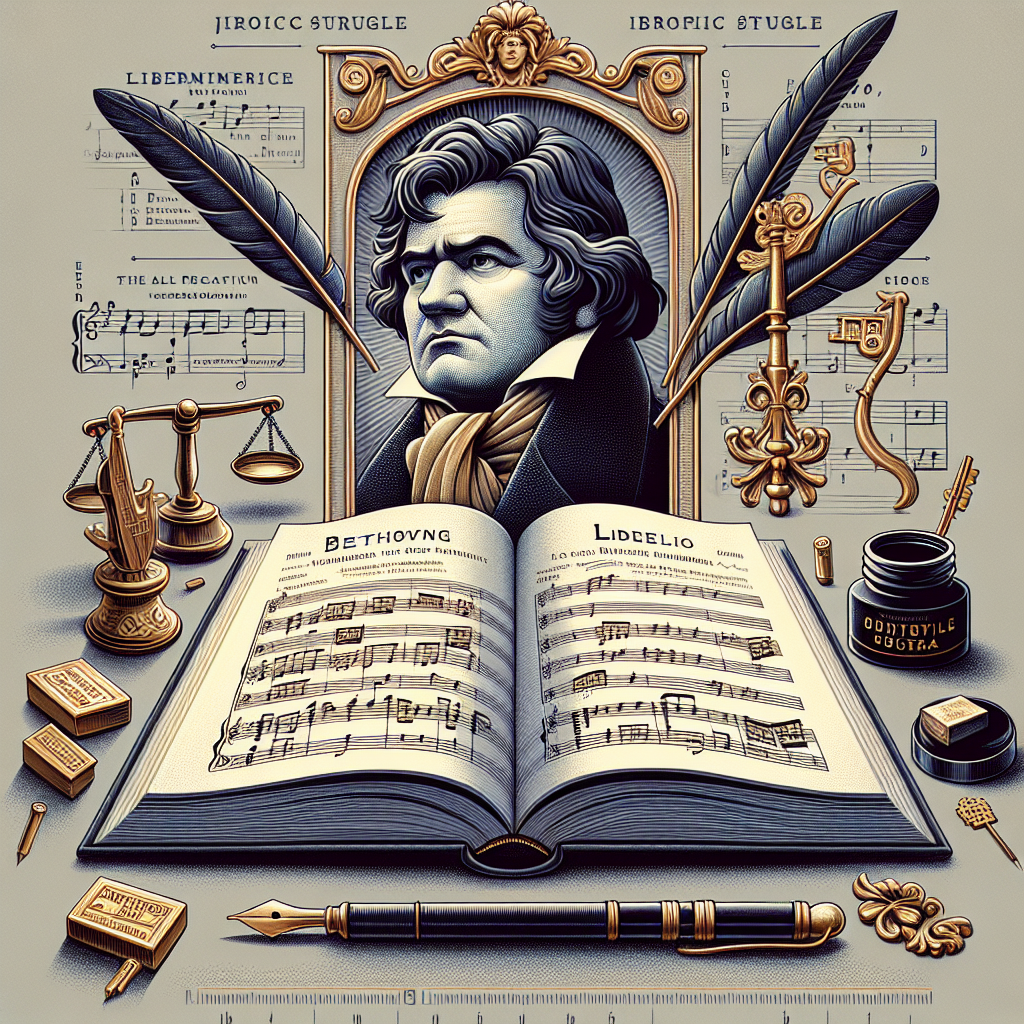
Beethoven’s Fidelio: A Masterpiece of Love and Freedom
Ludwig van Beethoven, primarily celebrated for his symphonies and sonatas, made a singular but significant contribution to the world of opera with “Fidelio.” This opera, unique in Beethoven’s oeuvre, stands as a powerful testament to his musical genius and his deep engagement with themes of freedom, love, and heroism. “Fidelio” is not merely an opera but a profound statement on human resilience and the pursuit of justice.
The Genesis of “Fidelio”
The inception of “Fidelio” intertwines Beethoven’s personal aspirations with the broader artistic and political currents of early 19th-century Europe. Initially titled “Leonore, oder Der Triumph der ehelichen Liebe” (Leonore, or The Triumph of Marital Love), the opera underwent several revisions before reaching its final form in 1814. The libretto, based on a French play by Jean-Nicolas Bouilly, resonated deeply with Beethoven’s own ideals of liberty and justice.
Beethoven faced numerous challenges in composing “Fidelio,” including his deteriorating hearing and the complexities of integrating his symphonic style with operatic narrative. Despite these obstacles, he was driven by his commitment to the opera’s themes, reflecting the tumultuous political climate of Europe during the Napoleonic Wars and his own democratic leanings.
Plot Overview
“Fidelio” is set in a Spanish prison near Seville and tells the story of Leonore, who disguises herself as a man named Fidelio to rescue her husband, Florestan, a political prisoner. The opera opens with a duet between Jaquino and Marzelline, followed by Leonore gaining the trust of Rocco, the jailer, to reach her husband. The narrative unfolds with themes of despair and hope, leading to a dramatic climax where justice prevails and love is rekindled.
The storyline explores profound themes through its characters. Leonore’s bravery and unwavering commitment to her husband epitomize heroic sacrifice, while Florestan’s plight highlights the cruelties of political oppression. The resolution of the opera, with the triumph of justice and freedom, reflects Beethoven’s optimistic belief in the human spirit’s resilience.
Musical Brilliance
Beethoven’s “Fidelio” is characterized by its emotional depth and innovative use of musical techniques. The opera’s score ranges from intimate moments to powerful choruses, reflecting the narrative’s shifts from personal love to universal themes of freedom and justice. One of the most notable aspects of “Fidelio” is its use of leitmotifs—recurring musical phrases associated with characters or ideas—which predate and influence later works by composers such as Richard Wagner.
The overture of “Fidelio,” particularly “Leonore No. 3,” is celebrated for its symphonic qualities and dramatic power. Although it has been revised several times, it remains a testament to Beethoven’s ability to blend orchestral grandeur with operatic demands. The quartet “Mir ist so wunderbar” in Act I and Florestan’s aria “Gott! Welch Dunkel hier!” in Act II are among the opera’s most famous musical numbers, showcasing Beethoven’s skill in conveying complex emotions through music.
Symbolism and Themes
The Triumph of Love
At its core, “Fidelio” is a love story, but it transcends mere romance to depict profound, sacrificial love. Leonore’s dedication to rescuing her husband from tyranny underscores the strength of marital love and fidelity. Her character’s heroism was groundbreaking at the time and remains a powerful statement on the strength and courage of women.
Freedom and Justice
“Fidelio” is also a political opera, reflecting the liberal ideals of the Enlightenment and Beethoven’s own beliefs. Written during a period of significant political upheaval, the opera celebrates freedom and condemns tyranny, resonating with contemporary audiences and continuing to inspire today.
Heroism and Sacrifice
Leonore embodies heroism and sacrifice, willing to risk everything for her husband’s freedom. Her journey through the oppressive prison environment and her eventual triumph symbolize the resilience and courage needed to overcome injustice. This portrayal of a female hero adds a unique dimension to the opera, emphasizing the role of women in the fight for justice.
Light and Darkness
Beethoven employs the symbolism of light and darkness to reflect the themes of hope and despair throughout “Fidelio.” The transition from the gloomy atmosphere of the prison to the bright, triumphant finale mirrors the journey from oppression to freedom. This use of symbolism enhances the emotional impact of the opera, making the audience deeply feel the stakes of the narrative.
Detailed Analysis of Key Scenes and Musical Elements
Act I: The Prison
The first act sets the tone of oppression and despair within the prison. The characters’ interactions establish the central themes subtly, with Marzelline’s unrequited love for Fidelio and Rocco’s pragmatic approach to his duties contrasting with Leonore’s hidden agenda. The quartet “Mir ist so wunderbar” is a standout piece that elegantly conveys the characters’ disparate emotions.
Act II: The Dungeon
Act II opens with Florestan’s aria, “Gott! Welch Dunkel hier!,” a haunting reflection of his suffering. The act builds to a tense climax with Leonore’s dramatic reveal and confrontation with Pizarro. The use of musical motifs and dynamic contrasts in this act highlights Beethoven’s ability to convey dramatic tension and emotional depth.
The Finale
The finale of “Fidelio” is a triumphant celebration of freedom and justice. The chorus “Heil sei dem Tag!” (Hail to the Day!) encapsulates the opera’s core message of the triumph of good over evil. This final act is marked by jubilant music, reflecting the joy of liberation and the enduring power of love and justice.
Legacy and Influence
“Fidelio” has left an indelible mark on the world of opera and music at large. Its blend of deep emotional resonance, complex characterizations, and profound thematic content elevate it beyond mere entertainment. Despite the initial struggles and revisions, “Fidelio” stands as a symbol of the human spirit’s resilience and the enduring power of love and justice.
Beethoven’s only opera remains a cherished member of the operatic canon, continuing to inspire and move audiences with its timeless message. It serves as a powerful reminder of Beethoven’s unique contribution to the world of opera and his unwavering belief in the principles of freedom, love, and justice.

Reception and Revisions
Initial Reception
The initial performances of “Fidelio” in 1805 were met with a lukewarm reception, largely due to the unfavorable circumstances of its premiere. Vienna was under French military occupation, and the predominantly French audience had little interest in a German opera with themes of freedom and resistance. This initial failure did not deter Beethoven, who was convinced of the opera’s potential and undertook significant revisions to improve it.
Major Revisions
In 1806, Beethoven shortened the opera from three acts to two, with significant help from his friend Stephan von Breuning. This version, performed under the title “Leonore,” received a better response but still did not achieve the success Beethoven desired. Further performances were hindered by disputes with the theater management.
The final and most successful revision came in 1814, with a new libretto by Georg Friedrich Treitschke. This version, performed at the Kärntnertortheater, was a triumph and solidified “Fidelio” as a staple of the operatic repertoire. Beethoven’s persistence in refining “Fidelio” over a decade demonstrates his dedication to the work and his belief in its message.
Legacy and Influence
“Fidelio” has had a lasting impact on the operatic world and beyond. Its themes of freedom, justice, and the triumph of good over evil have resonated with audiences for over two centuries. The opera’s influence is seen in later works that tackle similar themes, and its musical innovations have been studied and admired by generations of composers and musicians.
Beethoven’s only opera continues to be performed regularly worldwide, a testament to its enduring power and relevance. It stands as a unique and powerful expression of Beethoven’s artistic vision and his deep commitment to humanistic ideals.
Conclusion
“Fidelio” is more than just an opera; it is a profound statement on the human condition, a testament to the power of love and justice, and a showcase of Beethoven’s musical genius. Through its rich musical textures, dramatic narrative, and timeless themes, “Fidelio” continues to inspire and move audiences, reflecting Beethoven’s enduring legacy as a composer and a champion of human values.